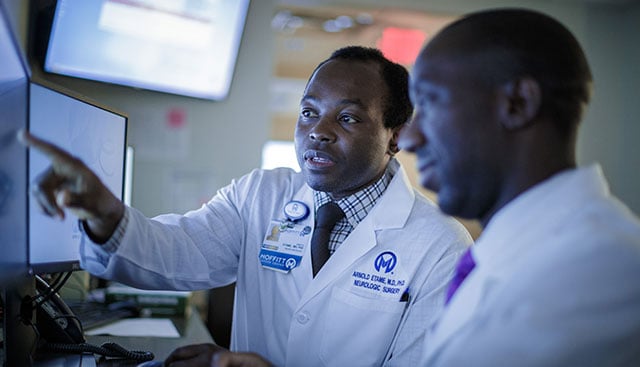
Top 5 Misconceptions About Referring Patients to Moffitt
Practitioners can refer patients directly to Moffitt for prevention, screenings, and diagnosis services as well as cancer care, but common misconceptions may be holding some back from doing so. Early detection and treatment provide greater access to treatment options, so clearing up these misconceptions is key to increasing early referrals and improving patient outcomes.
Below are the top five misconceptions about referring patients to Moffitt:
Misconception 1: Patients Need a Diagnosis (or Symptoms) to Come to Moffitt
Patients don’t need a cancer diagnosis from a specialist to come to Moffitt. In addition to our multispecialty cancer care teams, Moffitt also offers a wide range of services to help with cancer prevention and diagnosis.
Even if there is a cancer suspicion, getting patients to Moffitt first for a diagnosis is the best course of action. Moffitt has advanced screening and diagnostic services for those who have not yet received a cancer diagnosis, including diagnostic imaging technology, genetic testing, pathology tests, blood and tissue analyses, and more.
Moffitt patients also do not need to show symptoms. Early detection allows for the best chance of beating cancer, and a diagnosis can happen before a patient shows symptoms with preventative screenings.
By the time a patient’s experiencing cancer symptoms in an emergency room, it’s usually too late for preventative care, so referring patients to Moffitt for cancer prevention services can be life-changing or even life-saving.
If you have a patient you think would benefit from preventative, diagnostic, or cancer treatment services at Moffitt, your referral is not the end of your care. Moffitt partners with referring providers on the care of the patient, taking into consideration their past patient-physician relationship and medical history.
Misconception 2: Genetics Testing is Out of Reach
Another common misconception about referring patients to Moffitt, or cancer centers in general, is that genetic testing for hereditary cancer risk syndromes and cancer genes is out-of-reach for many, costing thousands of dollars.
For patients who want to learn more about their cancer risks, especially those who have a high hereditary risk of cancer, genetic testing at Moffitt’s GeneHome clinic is affordable and often covered by insurance. While genetic tests used to be much more costly, most patients today pay $0-100 with insurance or choose a self-pay option for $250.
Misconception 3: A Cancer Facility is a Worst-Case Scenario
Eliminating the misconception that cancer facilities are worst-case scenarios is critical because prevention and early detection are the best ways to reduce the burden of cancer on families and societies. Since nearly half of cancer deaths worldwide could be preventable, improving health systems to focus on prevention can lead to better outcomes and save lives.
Patients don’t need a stage 4 diagnosis to come to Moffitt. We welcome early cancer cases as well as patients without a diagnosis. Referring patients to Moffitt first, even before a diagnosis or in an early onset cancer stage, provides them with the latest state-of-the-art technologies and treatments available and sets them up for success.
Moffitt provides each new patient rapid access to an expert after scheduling your appointment, faster than any other cancer hospital in the nation. Our patient outcomes often exceed national averages, so being a Moffitt patient is often the best place to be for those with a cancer suspicion or diagnosis no matter the stage.
Misconception 4: It's Difficult to Know Where (and to Whom) to Refer
You can learn more about Moffitt’s specialists and who to refer patients to by taking advantage of our physician liaisons, who serve as a point of connection between Moffitt and referring providers. We can provide information about new technologies, treatments, and clinical trials, support you with online referrals and communicate with Moffitt faculty and staff on your behalf.
You can also get involved through webinars, dinner seminars, or grand rounds and take advantage of meet and greets and open houses.
By becoming more intimately familiar with Moffitt’s specialties and services, you can know where to best refer patients, including those with limited English proficiency or who are hard of hearing. Moffitt offers a Language Services department that works to break down the language barrier by offering high-quality, professional language access services to patients with diverse language and communication needs.
Misconception 5: Out-of-State Patients Can't Be Treated
Just because your patient is out of state doesn’t mean they can’t be treated by Moffitt.
Moffitt welcomes patients from around the U.S. and the world. OurInternational Referral Services Department helps plan for treatment at Moffitt for any patients traveling abroad, and lodging options range from the Hope Lodge to local hotel partners offering shuttles and competitive rates for patients and families. Moffitt also has a Financial Clearance Unit Navigator to assist with budgeting and provide resources for an upcoming trip to Moffitt for treatment.
Partner with Moffitt on the care of your patients, whether there is a cancer suspicion, hereditary risk, or diagnosis. Refer your patient to Moffitt to ensure they’re treated at the safest place to receive the best care.
To refer a patient to Moffitt, complete our online form or contact a physician liaison for assistance or support. As part of our efforts to shorten referral times as much as possible, online referrals are typically responded to within 24 - 48 hours.
